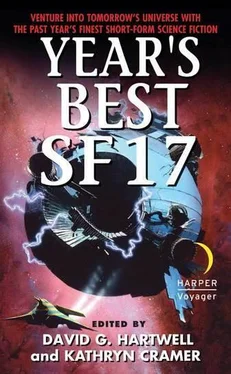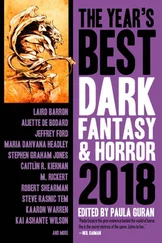“Please don’t break that,” Arinze said in Igbo. His accent was vaguely Nigerian, Yoruba. But not quite. How long had he been on Mars? He had to have been born there. He looked about thirty. Yet he had three short vertical tribal markings on each cheek. So they were still practicing that tradition even on Mars?
“We need that to navigate properly,” he said.
“You just nearly killed me!”
“I’m sorry,” he said. “I was … I thought you were going to hurt it. It’s … it’s like a snail without a shell until it makes a new living shell.”
I didn’t lower my wrench.
“That’s … that’s why it attacked you,” he said. “Then we realized a lot of things.” He paused. “What are you?”
“I’m human. A shadow speaker.” I shook my head. “It’s a long story.”
He stared at me. I knew he was making up his mind. I’d made mine up. If he tried anything, I’d smash the screen and then smash his head. “Arinze,” I said, quickly. “I know who you are. I know you have befriended this creature. You understand each other.”
“How do you know?” he snapped. “What can you know?”
The creature stretched a narrow filament and touched Arinze’s forehead. Affectionately. Arinze seemed to relax.
I felt a pinch of envy. I was constantly getting attacked because of what I looked like. This creature had no shape and could look like anything it wanted. And then it could create an exo-skin that it could wear or send to do what it asked … at least until it sunk into the sand on a planet with stronger gravity than it was used to. I wondered why it had chosen to make its exo-skin look like a giant bipedal grasshopper.
“It ‘reads’ things through vibration,” I said. “I am similar. I read things by closeness and focusing. I read it as it read me. You know I’m right. It has told you. Trust it.”
“Put the wrench down,” he said. “I’m not going to hurt you.”
“How do I know?”
He sighed and sat on a stool, now rubbing his own temples. “You know. You both know.”
I didn’t put it down. “Please,” I said. “I’m tired of fighting.” I leaned against the controls, feeling very, very tired. “What is it about me that everyone wants to attack? I just came here to greet you people. To see.” I sighed, tears finally falling from my eyes. Why did everyone think I was evil? One of the last things my mother had said to me before I ran away was that I was wahala , trouble.
He frowned. “Did I hurt you?”
I waved a hand at him. It was too much to explain.
“I’m sorry,” he said again.
“So am I,” I said, sitting on the floor.
There was a clicking sound as the alien’s appendage screwed something in beneath the front window controls. There was a soft whirring. The creature’s body twisted up and leaned toward Arinze.
“I’m not held captive here,” he said. “They all think I am but I’m not.”
“I know.”
“It’s been ugly on this shuttle,” he said. “We had to lock them up. Were they all okay?”
I nodded.
“Good. I’m … I’m going to go back with it. It’s not the only one that’s been discovered by the Mars government and there were some government officials on this shuttle who will alert those here on Earth. If I don’t go with this one, to help it speak to its people, there will be a war. It tells me so. Like here. It was war, right?”
“Yes. Nuclear and something else.”
He nodded. “I have to go back.”
“You’ve never been outdoors, have you?”
“No. But …” he said. He looked at the creature, a sadness passing over his face. The creature was focused on getting home. “What’s happened to Earth?”
“It’s a long story.”
He chuckled. “Have you heard news of Nigeria? My grandparents are from there.”
I smiled. “Nigeria is still Nigeria.”
“One day …” He took my hands. “You’d better get off the ship.”
The creature moved a filament across the green virtual grid above it and the shuttle shook hard enough to make me stumble.
“Go!” Arinze said. “Hurry!”
I made for the door and then turned back. I ran to Arinze and shook his hand. “I hope you come back,” I said.
Before I ran off, quickly like a striking snake, the creature reached out and touched my forehead with a moist appendage. It was neither warm nor cold, hard nor soft, absolutely foreign. Only one image came to me from its touch: An empire of red dust in a place that looked like the Sahara desert. Here strange things grew and withered spontaneously. As they did now on Earth. The communities of these creatures were more like the Earth of now, especially in the Sahara. I breathed a sigh of surprise. Then I could feel it more than I heard it. A vibration that tickled my ears. My people do not understand Mars Earthlings, but they will understand when I tell about you, Fisayo. You are not wahala. You are the information I needed.
Arinze was pushing me. “Go!” he shouted.
I went.
I barely made it off the shuttle before it started rumbling. Plantain was there, waiting. I jumped on her and she took off. We joined the others two miles from the shuttle as it launched into the sky with impossible power and speed. I’d seen what the alien did to the shuttle when I read it, but I didn’t have the capacity to understand its science. The Igbo woman who’d wanted to come to the cockpit with me cried and cried when she didn’t see Arinze with me. Ahmed stood close to his grandfather. His grandfather had his arm over his shoulder.
Ahmed and I did not say good-bye. As they were all deciding if they should wait for officials to arrive or try to make it to the next town, Plantain and I left. There was too much to say and no space to say it. Plantain and I headed south, back home, to Jos. Crossing the Sahara to Agadez was a silly idea. I needed to have long talk with my parents.
There was other life on Mars. Even after all that had happened here on Earth, I had to work to wrap my mind around that. Allah protect Arinze and the one he’s befriended; provide them with success. There’s been more than enough wahala.
Laika’s Ghost
KARL SCHROEDER
Karl Schroeder (www.kschroeder.com) lives in Toronto, Ontario, where he divides his time between writing fiction and consulting—chiefly in the area of Foresight Studies and technology. His work of forecasting fiction, Crisis in Zefra , was published by the Directorate of Land Strategic Concepts of the National Defense Canada in 2005. He began to publish stories in the 1990s, and he has, beginning with Ventus (2000), published seven science fiction novels and a collection of earlier stories. His most recent novel is the final Virga novel, Ashes of Candesce , published in 2012. Recently, he has begun to develop his Bruce Sterling-esque character, Gennady the Russian agent, as the protagonist of a series of stories, including “To Hie from Far Cilenia” in last year’s volume of this book. We hope for a collection of these excellent stories, including the one that follows here.
“Laika’s Ghost” is another story first published in Engineering Infinity . Laika was of course the name of the canine Russian cosmonaut who died in space prior to the first human spaceflight. Somewhere in the arid, radiated steppes of the former Soviet Union someone may have perfected the portable nuclear bomb that would destabilize the world for the forseeable future. Gennady, so cool and yet so socially timid, is forced to take along an American kid recently returned from Mars, even though it is a surefire recipe for extra trouble.
The flight had been bumpy; the landing was equally so, to the point where Gennady was sure the old Tupolev would blow a tire. Yet his seat-mate hadn’t even shifted position in two hours. That was fine with Gennady, who had spent the whole trip trying to pretend he wasn’t there at all.
Читать дальше












